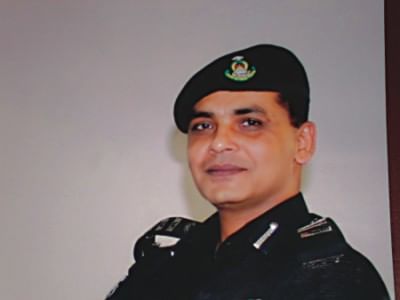<i>A vacation never came true</i>

Colonel Gulzar
For three months Colonel Gulzar had been planning to go on a vacation with his family. But before he got the opportunity, an irreversible turn in life took him to the place where he would never need a vacation anymore.
Col Gulzar Uddin Ahmad was killed during the February 25-26 bloody mutiny at the Pilkhana BDR headquarters last year. He had been deputed to BDR from Rapid Action Battalion just a couple of weeks ago.
Col Gulzar was known as a brilliant committed army officer who did the challenging job of fighting militant outfit Jama'atul Mujahideen Bangladesh from the forefront while serving the Rab in the middle of the last decade.
"He was a brave man--he would never think how challenging or risky a task was...He was committed to discharging his duty wherever he was posted," says Fatema Sultana, Gulzar's widow.
Fatema could not believe even after over a month of the incident that her husband was killed.
"The moment I learnt about the incident on February 25 morning it occurred to me that he would survive somehow," she says. Because she had never seen Col Gulzar get scared in any situation since their marriage in 1994. "Rather it would often irritate him to see us getting scared of anything."
The Daily Star correspondents were having this conversation on a morning recently in the drawing room of Fatema's Dhaka Cantonment residence from where Gulzar went to the BDR Darbar around 7:30am on February 25. A framed picture of Gulzar receiving a crest from the Rab director general was hung on the wall above where Fatema was sitting.
Gulzar was "a very practical and disciplined person", she says.
She was alone in the house. Her daughters Jahin Tasnia, 14, and Lamia Saiyara, 10, were at school. Jahin is a student of class IX and Lamia class IV at Shaheed Anwar Girls' High School and College near their house.
Fatema did not want her daughters to be present during such conversations about their beloved father because she feared this could push them into the sadness and depression again. "I have been deeply saddened all the time in the last one year but I had to struggle to bring back my daughters to normal life," says Fatema.
Jahin stood first when she was promoted to class VIII. She was still first in the first term examinations of class IX, but then she slipped to the second place in the second and third term exams. "She was heavily disturbed," Fatema says.
"My daughters miss their father in every aspect of their life...And about myself? I now have no one to share anything with," Fatema says in a choked voice.
Recollecting the day Gulzar was killed, Fatema says they were supposed to attend a lunch at Pilkhana that day. Before leaving, Gulzer just asked her to take the girls.
Then someone informed her over phone about the chaos at Pilkhana, but Fatema never thought for once that her husband might be killed.
On February 27 morning, when army officers' family members gathered in front of the main gate of the BDR headquarters to learn the whereabouts of their near and dear ones, Fatema was also there.
"Even at that time I never thought he was not alive. I always thought he was hiding somewhere. I hoped he would return," Fatema says.
"The hope was with me for a long time. But on the 40th day after the incident, when I was offering prayers I suddenly realised that he is no more with us," says Fatema.
Fatema cannot still understand why the soldiers brutally killed 57 brilliant army officers. "I always saw how the officers love their soldiers and the soldiers respect the officers in the military."
It was Gulzar's first posting in the BDR. He joined the paramilitary force in the second week of February 2009 as the commander of Sylhet sector. "He could not have enmity with any BDR soldier, so why would they kill him? Why would the BDR soldiers have wrath on him?" Fatema says.
"Definitely we want justice soon. But we also want to know the real reasons behind such brutal killing of brilliant officers," she says. "What happened in Pilkhana is still beyond my comprehension."
Gulzar was always busy because of his job, but he also had interest in hanging out with his wife and daughters whenever he had time.
He called many of his colleagues from Pilkhana immediately after the mutiny had started, but his family members did not get any call from him.
Gulzar's family were almost ready to shift to Sylhet, preparing to leave Dhaka on February 27. After the carnage, now the family has been allowed to stay in that house for two years.
One year has already passed, and Fatema does not know where they would go after a year.
"My daughters' school is near our house. They often ask me what will be in the future when they will have to leave this house," Fatema says. She feels that if they could live in this house for 10 years, they would be safe.
"I had a secured life when my husband was alive and now my life is filled with tension," Fatema says.
There is a little presage that miraculously, but sadly, became true on February 25.
Fatema said Gulzar returned to Dhaka in mid-February after Gulzar joined in Sylhet.
"It was February 15 or 16. I told him, 'I have heard that JMB is quite strong in Sylhet and you are moving around in that area openly, if anything happens?' He only said he would embrace martyrdom," says Fatema.
Col Gulzar embraced martyrdom just after 10 days of this conversation.

 For all latest news, follow The Daily Star's Google News channel.
For all latest news, follow The Daily Star's Google News channel. 



Comments